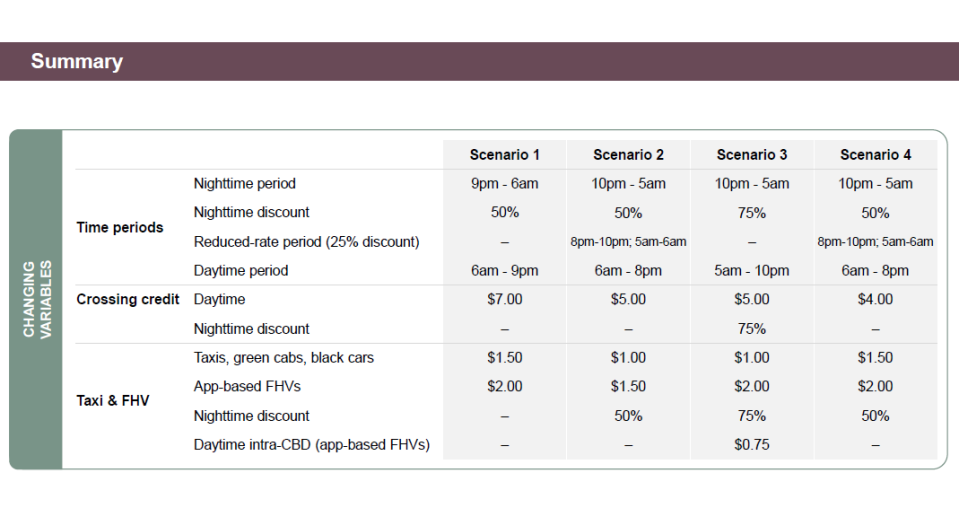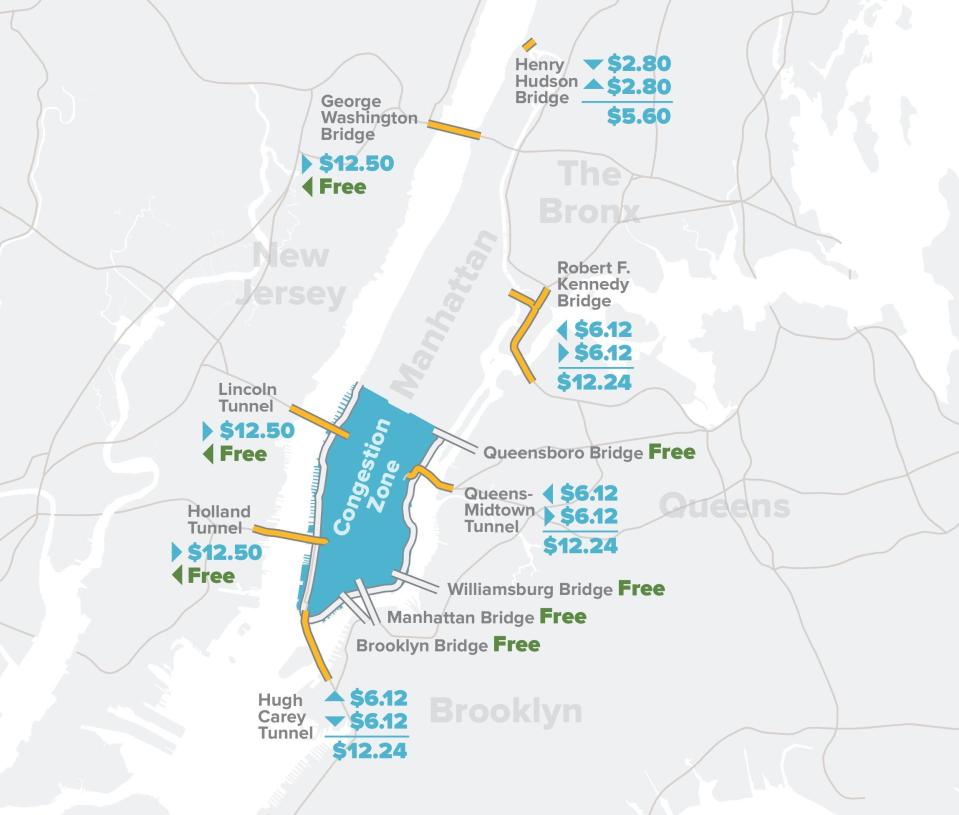Manhattan congestion pricing scenarios would give credits for tunnels, but not GW Bridge
- Oops!Something went wrong.Please try again later.
Are you a commuter or regular visitor to Manhattan from New Jersey? We'd like to hear what you think about the proposed congestion pricing plan for drivers entering Manhattan. Is it fair? Why or why not? Should any types of drivers get an exemption from the toll plan? You can email NorthJersey.com transportation reporter Colleen Wilson at Cwilson2@gannettnj.com with your comments.
Four scenarios of how toll credits and exemptions would work under a Manhattan congestion pricing program were presented to the Traffic Mobility Review Board on Monday.
The credits would be for those who take tunnels, including the Lincoln and Holland, that directly enter the toll zone, and would range from $4 to $7.
None of the scenarios presented included a credit for those taking the George Washington Bridge, which is a point of contention for New Jersey drivers, especially those in and around Bergen County who don't have direct train access to Manhattan.
More: What is congestion pricing? Answering all your questions about toll program for NJ drivers
The scenarios do include exemptions for buses, both those that are operated by NJ Transit and similar agencies and those contracted to work with government agencies.
"The scenarios that we’ll be discussing together all provide a moderate crossing credit. They don’t create full parity between entries, but they do help move things in that direction," said Juliette Michaelson, special adviser to the Traffic Mobility Review Board.
Story continues below photo gallery.
Toll amount not yet decided, contingent on exemptions
The actual toll amount has not yet been decided because it will be contingent on which of the scenarios and factors the board decides to include in the program. In addition to which crossings might get credits, the board is considering how to toll taxis, for-hire vehicles, trucks and motorcycles, as well as night or off-peak discounts.

Here is an overview of some of the key details from each scenario:
Scenario 1
Crossing credit: $7
Time periods: 50% nighttime discount from 9 p.m. to 6 a.m.
Scenario 2
Crossing credit: $5
Time periods: 50% nighttime discount from 10 p.m. to 5 a.m.
Scenario 3
Crossing credit: $5 (daytime); reduced 75% at nighttime
Time periods: 75% nighttime discount from 10 p.m. to 5 a.m.
Scenario 4
Crossing credit: $4
Time periods: 50% nighttime discount from 10 p.m. to 5 a.m.
Pushing for credits for GW Bridge and others
The Regional Plan Association, a nonprofit advocacy and research group that has promoted congestion pricing for decades, wrote a letter to the board advising it to credit "all drivers entering Manhattan for tolls paid if they continue into the congestion zone." In other words, the RPA recommends including credits for the George Washington, RFK and Henry Hudson bridges, which are crossings that don't directly enter the toll zone. Many drivers are tolled at those crossings before coming into the zone.
A critical part of how toll credits are decided is how much they could prevent or exacerbate toll shopping, which is when drivers go out of their way to take a crossing that is cheaper (or free) instead of a closer one that might cost more.

The Traffic Mobility Review Board, which is a group of six New Yorkers appointed to recommend how the new tolling program will work, are expected to make a recommendation "soon," said Carl Weisbrod, the board chair.
More: Could GW Bridge traffic increase from congestion pricing? Here's what one report said
Designed to reduce traffic and raise money for MTA
The congestion pricing program will be designed to toll drivers entering Manhattan below 60th Street to improve air quality and reduce congestion and generate money to support the Metropolitan Transportation Authority's public transportation capital plan.
The program has been met with significant criticism from New Jersey leaders, who say they should have been more involved, some of the money should be used to improve the Garden State's public transportation system, and New Jersey drivers should be credited for tolls already paid at major crossings over the Hudson River.
More: Could tiny Rhode Island give NJ the slingshot to defeat NY’s congestion pricing plan?
Gov. Phil Murphy sued the Federal Highway Administration this summer over its handling of the program, accusing the agency of violating federal law by not requiring New York to do a more in-depth review of the environmental impacts of the program.
A draft environmental review released last year showed scenarios in which the tolls could range from $9 to $23, with the toll dollar amount increasing as more credits and exemptions are awarded to certain drivers.
U.S. Reps. Rob Menendez and Bill Pascrell Jr., who are both against congestion pricing, sent a joint letter to the MTA last week urging the agency to consider using the toll money to extend the 7 subway line to the Secaucus train station, citing a 2013 study the MTA completed regarding the feasibility of a project like that.
"If the MTA and New York City are serious about alleviating congestion, it should improve public transportation by expanding the reach of their services and ridership through additional rapid transit options across the Hudson River," the letter from the congressmen said.
This article originally appeared on NorthJersey.com: NY congestion pricing would not give credits for GW Bridge
